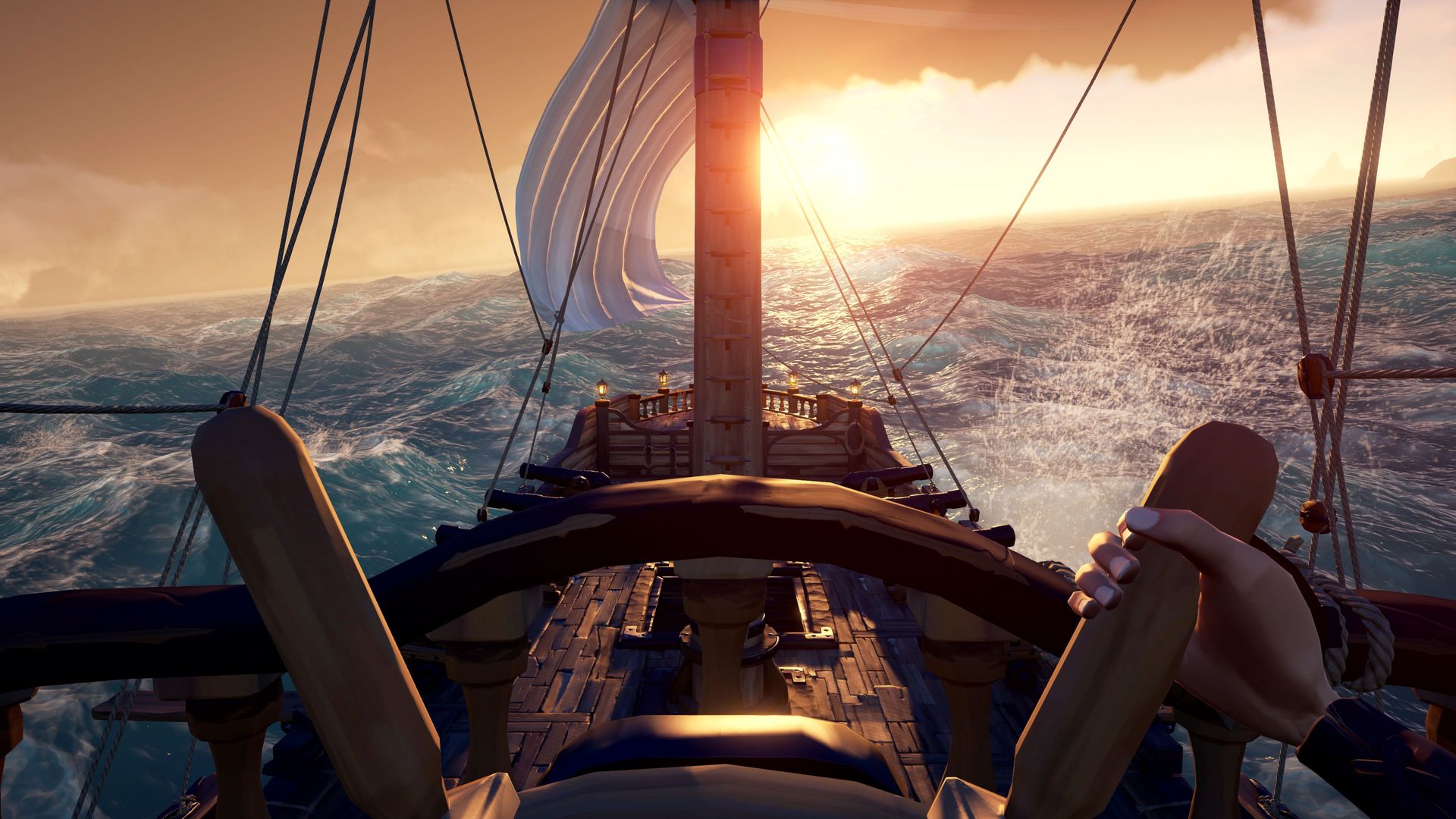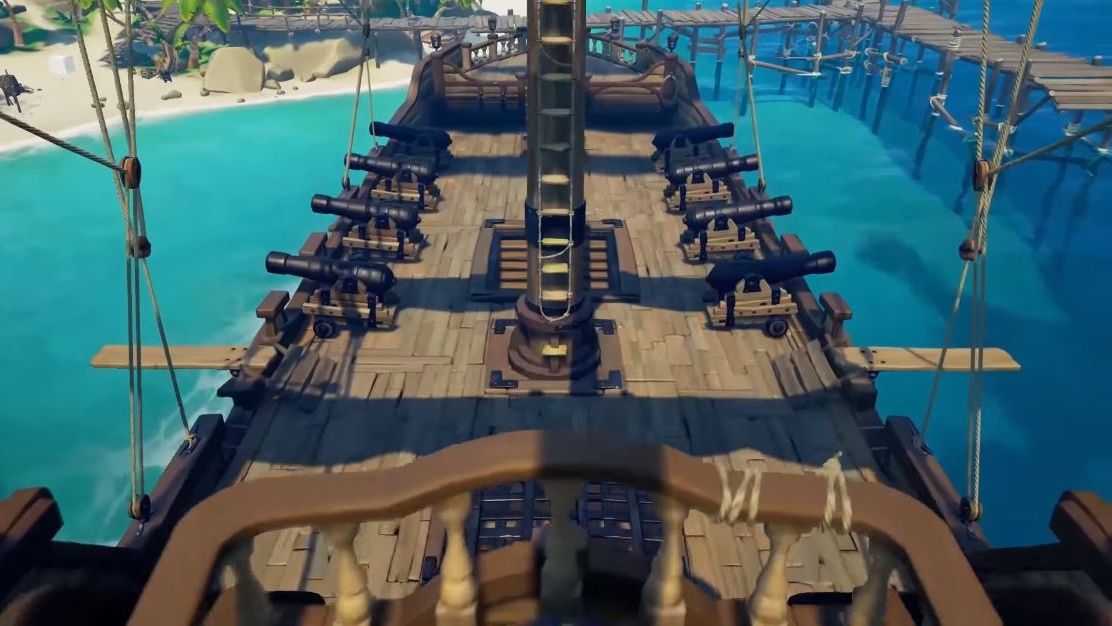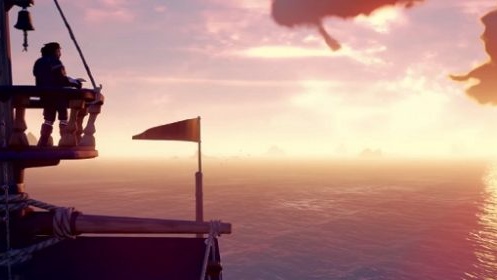Sea of Thieves has the potential to be a multiplayer experience unlike any other
A pirate's life, not the highlight reel

Sign up for breaking news, reviews, opinion, top tech deals, and more.
You are now subscribed
Your newsletter sign-up was successful
Between PUBG and Fortnite, online multiplayer games are having something of a watershed moment on streaming services. With their entertaining, tight gameplay that pits players against one another in exciting matches to the death, these Battle Royale titles have proven themselves to be eminently watchable and, as a result, extremely playable.
However, when its closed beta period started, Rare’s upcoming multiplayer pirate adventure Sea of Thieves soared past these other games to become number one on both Twitch and Mixer. The beta attracted more than 300,000 players and more than 14 million hours of footage was watched across the web. For a game that’s not even fully launched yet that’s pretty impressive.
It’s interesting that Sea of Thieves managed to make the splash that it did because while comparisons have been drawn between it, PUBG and Fortnite, it’s a very different experience.
The anti-Battle Royale
In Sea of Thieves, you won’t find timed matches which pit pirate against pirate. Instead you’ll find an open-ended open-world game which places a great deal of emphasis on soft skills and camaraderie.
Rather than matchmaking waiting rooms and countdown screens, filling out the spaces between the fort invasions, ship battles and treasure hunts there are long stretches of sailing on the open ocean.
While on paper these moments don’t read as particularly entertaining or thrilling, it’s in its long stretches of seeming nothingness that I think Sea of Thieves has truly achieved something in terms of affecting player emotions. It could very well be the game that sails us into a golden age for multiplayer.
Sea of Thieves is a game that uses simple controls in order to allow the complexity of the people playing it to shine through and make it what it is, creating a multiplayer experience quite unlike any we’ve ever had.
Sign up for breaking news, reviews, opinion, top tech deals, and more.

So often multiplayer games are very tightly structured, giving players tools, tutorials and objectives, allowing them to bond through shared aims, victories and losses. Dips in the action are rare, and instead players move from adrenaline spike, to adrenaline spike where the only breath they have to spare is used to shout instructions at their teammates.
But in Sea of Thieves the tools are simple, the quests open, and the tutorials – well, what tutorials? It’s less prescriptive than other multiplayer experiences and it's the game's frequently peaceful lows that give its thrilling highs so much more impact.
By allowing players to experience the calms between the storms, Sea of Thieves creates the potential for some genuinely individual experiences and the opportunity to explore our humanity.
The Rare development team told us they chose to prototype features such as musical instruments and grog drinking first, rather than sailing mechanics and ship battles. There’s a very good reason for this - ship battles and sailing are obviously fun for players to take part in together and there’s precedent on how to get them right.
Space for a story
Giving players reasons to stay together outside of high-intensity moments is more difficult, but it’s essential in Sea of Thieves; if you can’t effectively communicate with your crew when you’re relatively peacefully sailing between destinations, you’re not really going to have much hope when you go canon to canon with another crew.
The quiet moments are almost like training sessions for the time where your communication will matter most and, more importantly, they’re the spaces in which you build your own personal story.
It’s in your downtime on the Sea of Thieves that you get the chance to form or further relationships with your crew, decide where your place is on the ship, and be silly without any particular purpose. Basically, it's the space in which your very own lore is formed.

In the way that Minecraft gives players the tools and creative freedom to build a physical world, Sea of Thieves allows players to forge a story. In some senses everyone is playing exactly the same game, but it’s the differences between players and the game’s willing accommodation of those differences that make Sea of Thieves a personal experience.
With its slow yet unpredictable pacing, Sea of Thieves feels like a game that’s actually managed to accurately condense the feeling of living in a romantic pirate adventure. Between the swashing, and the buckling and marking every spot with an X, there has to be bonding, planning, sailing and grog.
Even when we didn’t have a crew and we were sailing solo over the sea, there was something about the bare bones nature of the experience that’s made it stay in our mind.
When you’ve set a course on your map, unfurled the sails and started your journey there’s just something about the sound of the water lapping around you and the sight of islands passing you by that stirs up an enjoyable feeling of anticipation – you have a sense that anything could happen and the space to ruminate on what you’d like it to be.
Real emotions
Something we found particularly enjoyable about these quiet moments, too, was that it’s hard to tell how long they’re going to last. Even when you’re having a laugh with the other members of your crew and seeing who can vomit the most grog, there’s an underlying tension and sense of foreboding, because you can never be sure when another set of sails will appear on the horizon.
When we were taking part in our group playthrough, one of our team declared “it’s weird we haven’t come across any other ships yet.” And like they had been summoned, sails appeared off the starboard side. Before another set popped up on the port side.
When those sails do appear, action doesn’t immediately commence. Other ships are always crewed by other players and, as you’ve been able to establish from working with your own crew, real players are unpredictable. Then you’re left with a nerve-wracking period of wondering whether these other players are going to be friends or foes. And deciding whether you want to be a friend or foe.

Sea of Thieves is eminently watchable because of its moments of piratical chaos, yes, but also because it has those down moments which give players chances to interact with one another and the world they’re playing in on a personal level. The game’s mechanics and situations are predictable, but the way players use them are far from it.
If we’ve learned anything from the rise in popularity of reality television, it’s that watching semi-natural human interaction is something we’re apparently fond of.
When you’re watching a Sea of Thieves stream, you’re not going to marvel at someone’s sailing or aiming skills, you’re going to enjoy the game world, their adventure, and their personality. This is a game that was made for natural-born entertainers and it’s completely understandable why it’s been picked up so quickly by the streaming community.
Future plans
Following Sea of Thieves’ beta there has been some concern expressed that, while it was fun, the game’s prescribed high points and quests have the potential to wear thin. You’ll only be able to do so many quests for the Gold Hoarders, or the Merchants Guild or the Order of Souls before you and your crew get tired of the repetitive format.
This is certainly something we’d agree with, but after a studio visit to Rare where we asked what the future looked like, it became apparent that the team has no intentions for its game to experience a short drop and sudden stop. Not only will it add new quests, new guilds to work for and in-world events at different times, there will also be smaller updates that will allow players to communicate in new and different ways.
Just as Sea of Thieves gameplay has swells and dips, its updates will be spaced out – deliberately so. While players will build their stories in the quiet moments of Sea of Thieves, Rare will use its downtime to watch and learn, making small changes while building up to the next big update.
“We’ve got a road map to the end of the year,” executive producer Joe Neate told us, “But stuff will change based on feedback. Our focus for launch is [...] let’s deliver a great experience with the features we have planned. And after that we want to - we’ve almost put a gap in our road map so that we can say let’s just listen and we can react to anything unexpected that comes up. And then as we move beyond that we’re looking at our first significant update to the game around three months in.”

While some players will be able to become pirate legends and gain access to an exclusive ship and captaincy, Neate informed us that other updates will introduce different quest types as well as timed events: “If you go into a tavern there might be an NPC there for the weekend that you haven’t seen and they bring a bit of lore and story and things to achieve within that time.”
He added, though, that there will be smaller updates which the team plans to push out as soon as they’re ready, “building up towards the more meaningful and bigger updates”, giving us an example of a speaking trumpet which “you can use to project your voice across ships [...] to parlay or talk.”
Overall, it appears that Sea of Thieves’ pacing and open world structure has benefits for its players, it also seems favorable from a development perspective.
Take a breath
Rather than tight, repetitive matches, which demand frequent noticeable updates, Rare has the chance to take a more organic approach with the changes it makes. Director, Craig Duncan, told us for example that if the team decides to add a statue, players might see it patched into the world bit by bit, as if it’s genuinely being carved out of a rock face.
This in turn, feeds into encouraging players to enjoy the opportunity to slow down and look closely at the world around them in their downtime, creating a productive cycle which leaves players and developers happy.
Whether the moments of quiet we so enjoyed in our relatively short time with the game will translate to more consistent long-term play we can't be sure, but we have a good feeling. It feels like we're getting a game that dares to include all those moments Sid Meier's Pirates! couldn't or wouldn't.
While it’s natural to crave constant action from your games, we highly recommend that with Sea of Thieves you take the time to bask in the moments of calm, crew or no crew. As predictable as the tide, the next battle and update will come.
Get to know other players, pause mid-quest to pick up that message in a bottle, climb up to the crow’s nest and just sit for a while. We guarantee you’ll never forget your first sunset.
- This is everything we know about Sea of Thieves

Emma Boyle is TechRadar’s ex-Gaming Editor, and is now a content developer and freelance journalist. She has written for magazines and websites including T3, Stuff and The Independent. Emma currently works as a Content Developer in Edinburgh.